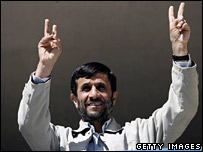
We are currently only days away from a UN deadline for Iran to halt work on its nuclear programme (which it has claimed it will not do).
I had do a role play in my Masters course on Iran and I was interestingly enough given the role of Britain, whose role in this affair has been prominent as part of the original EU3 trying to tempt Iran with a package of economic benefits to step down from its enrichment of uranium. Our negotiations failed sadly at that stage! This begs the question of what is better - carrots or sticks!
Some other interesting points
- Enriching uranium is only a possible route to nuclear weapons - it can be used just to help the Iranian economy which is is need of additional sources of energy. Yet sceptics say it can get fuel from other nations.
- A fatwa against nuclear weapons has been issued by the Supreme leader Ayatollah Khamenei.
- Could Iran make a bomb - estimates from the International Institute for Strategic Studies in London vary from between about three to five years up to about 15 years, depending on Iran's abilities and intentions. But first it would have to take the decision to go down that path. That would mean enriching uranium much more highly than it says it has done so far.
- Iran has supposedly hid its enrichment program from the West for the past 18 years and has put a lot of it underground - suspecious or understandable given predictable reactions from the West?
- Iran is entitled, under the Nuclear Non-Proliferation Treaty (NPT), to enrich its own fuel for civil nuclear power, under IAEA inspection.
- Pushing the issue could mean Iran leaving the NPT and continuing its enrichment without any supervision whatsoever - Article 5 of the treaty allows for withdrawal
My opinion - the US claims it wants a diplomatic route and it would be wise not to embark on another very costly adventure that will only further damage its reputation in the Middle East (if it ever had one). Iran must prove itself trustworthy by confidence building measures (I don't particularly trust it). Hopefully the crisis will die down with Iran taking this package- but something about appeasing Iran doesn't really sound right to me? Could it come back to haunt us later?
No comments:
Post a Comment